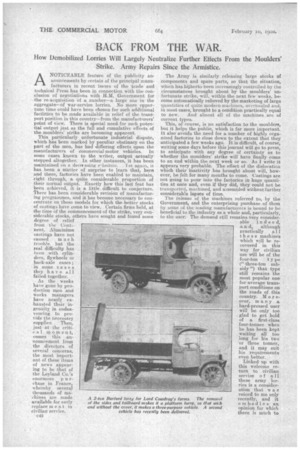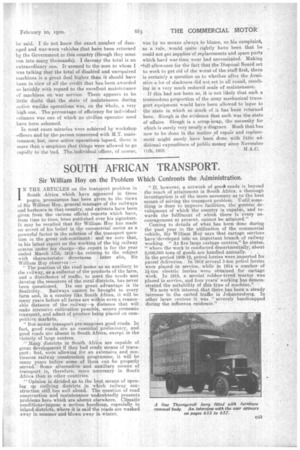BACK FROM THE WAR.
Page 24

Page 25

If you've noticed an error in this article please click here to report it so we can fix it.
How Demobilized Lorries Will Largely Neutralize Further Effects From the Moulders' Strike. Army Repairs Since the Armistice.
ANOTICEABLE feature of the publicity annbancements by certain of the principal manufacturers in recent issues of the 'trade and technical Press has been in connection with the conclusion of negotiations with H.M. Government for the re-acquisition of a number—a large one in the aggregate—of war-service lorries. No more opportune time could have been chosen for such additional facilities to be made available in relief ofthe tranSport position in this country—from the manufacturers' point of view. There is special need for such potential output just as the full and cumulative effects of the moulders' strike are becoming apparent.
This particularly unfortunate industrial dispute, which has been marked by peculiar obstinacy on the part of the men, has had differing effects upon the manufacturers of commercial-motor vehicles. In some cases known to the writer, output actually stopped altogether. In other instances, it has been maintained on a deem asing s-hedule. Yet again, it has been a Matter of surprise to learn that, here and there, factories have been enabled to maintain, alight through, a quite considerable proportion of their normal output. Exactly how this last feat has been achieved, it is a little difficult to conjecture. There has been considerable revision of manufacturing programmes, and it has become necessary to Concentrate on those models for which the better stocks of castings have come to view. Certain firms held, at the time of the commencement of the strike, very considerable stocks, others have sought and found some degree of relief from the Cent,nent. Aluminium castings have not caused much trouble. but the real difficulty has been with cylinders, flywheels or hack-axle cases ; in some cases they haye all failed together.
As the weeks have gone by production men and works managers have nearly exhausted their ingenuity_ in endeavouring to provide the necessary supplies Then, just at the critical moment, comes this announcement from the directors of several concerns, the most important of these items of news appearing to be :that of the Leyland Co.'s enormous p u rchase in France, whereby several thousands of machines are made available for early replace ment in civilian service.
-042 The Army is similarly releasing large stooks of components and spare parts, so that the situation, which has hitherto been increasingly controlled by the circumstances brought about by the moulders' unfortunate strike, will, within the next few weeks, become automatically relieved by the marketing of large quantities of quite modern. machines, overhauled and, in most cases, brought to a condition practically equal
to new. And almost all of the machines are of current types.
This, of course, is no satisfaction to the moulders, but it helps the public, which is far more important. It also avoids the need for a number of highly organized factories to close down to the extent that they anticipated a few weeks ago. It is difficult, of course, writing some days before this journal will go to press, to anticipate with any degree of certainty as to whether the moulders' strike will have finally come to an end within the next week or so. As I write it appears very probable. The effect of the dislocation which their inactivity has brought about will, however, be felt for many months to conic. Castings are not going to pour into the factories in huge quantities at once and, even if they did, they could not be transported, machined, and assembled without further considerable lapses of time.
The release of the machines referred to, by the Government, and the enterprising purchase of them by some of the leading manufacturers is bound to be beneficial to the industry as a whole and, particularly, to the-user: The demand still remains very considerable indeed, a.n d, although
practically a 11
these machines which will be recovered in this way for civilian use will be of the four-ton t y pt (" three-ton subsidy ") that type still remains the most popular one for average transport conditions on the roads of this country. M o r eover, m any a hard-pressed user will be only too
• glad to get hold of a first-class four-tonner when he has been kept waiting all too long for his two or three tonner, and it may suit his requirements even better.
Linked up with this welcome return to civilian service of all these army lorries is a consideration that w a s voiced to me only recently, and it embodies an opinion for which there is much to
be said. I do not know the exact number of damaged and war-worn vehicles that have been returned by the Government to this country (though they must rlill into many thousands). I daresay the total is an extraordinary one. It seemed to the man to whom I was talking that the total of disabled and unrepaired machines is a great deal higher than it should have been in.view of all the credit that has. been awarded so lavishly with regard to the excellent maintenance of machines on war service. There appears to be little doubt that the state of maintenance during. active warlike operations was, on the whole, a very high one. The percentage of efficiency for individual columns was one of which no civilian operator need have been ashamed.
In most cases miracles were achieved by workshop officersand by the person concerned with M.T. maintenance, but, once active operations lapsed, there is more than a suspicion that things were allowed to go rapidly to the bad. The individualaofficer, of comic, was by no means always to blame, as his complaint, as a rule, would quite rightly have been that he could not get supplies of replacements and spare parts which hard war-time wear had necessitated. Making -full allowance for the fact that the Disposal Board set to work to get rid Of the worst of the stuff first, there . i$ certainly a question as to whether after the Armistice a lot of slackness did not set in all round, resulting in a very much reduced scale of maintenance.
If this had not been so, it is not likely that such a tremendous proportion of the army mechanical transport equipment would have been allowed to lapse to the state in which so much of it has been returned here. Slough is the evidence that such was the state of affairs. Slough is a scrap-heap, the necessity for 'which is surely very nearly a disgrace. Much that has now to be done in the matter of repair and replacement might surely have been done with little additional expenditure of public money since November t 1 th, 1918. M.A.C.






























